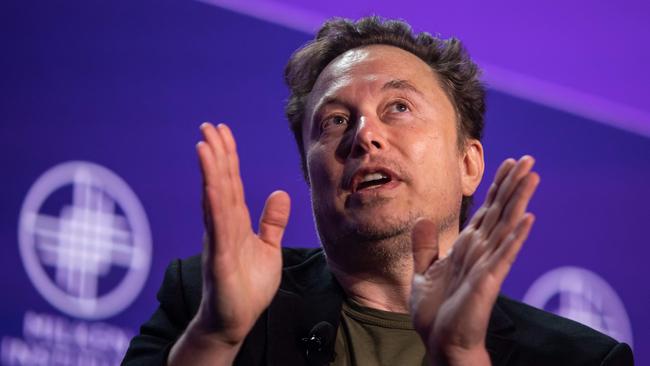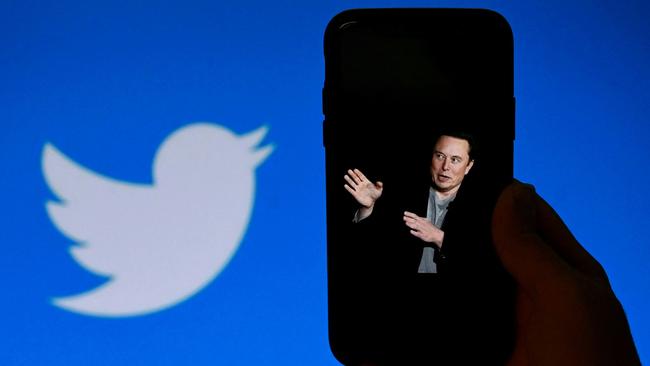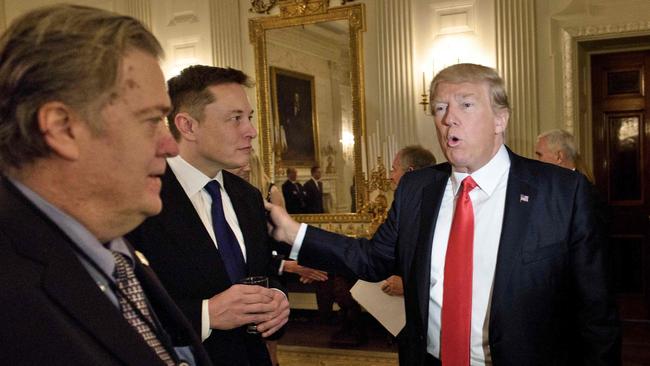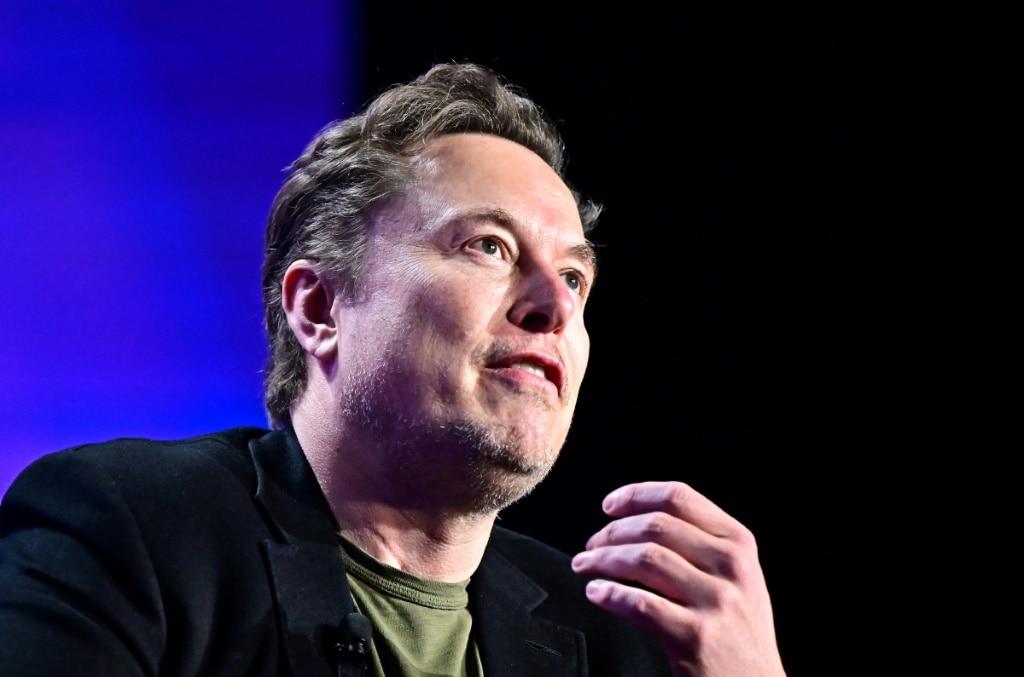Elon Musk’s X still holds sway in politics despite descent into darkness
Two years after Elon Musk’s chaotic takeover, X is losing billions. But it’s still setting the political agenda and has had some success in promoting his libertarian views.

There was nothing inevitable about this year’s biggest news announcement being posted on X. When US President Joe Biden stood down by sharing a letter on the Elon Musk-owned social platform on July 21, he upended American politics.
But Biden also confirmed something else. Almost two years on from his takeover, Musk’s eye-wateringly expensive $44bn ($67bn) gamble to transform Twitter into X has not undermined the fundamental relevance of the site. What leads the nightly news and splashes on front pages across the globe still usually appears first on Musk’s X.
Just under two years ago, in an unprecedented move, Musk seized control of the world’s pre-eminent site for political and cultural discussion. Companies of Twitter’s size are usually bought by other corporations, not individuals, and obituaries for Twitter began being written the day Musk bought it.
Few thought Musk, a Twitter addict, truly understood what he was getting himself into.
“You f..ked up real good, kiddo,” was how Nilay Patel, editor-in-chief of influential tech news site The Verge welcomed Musk’s takeover of the “disaster clown car company”.
Tales of dysfunction and mass sackings poured out from the company’s San Francisco headquarters. And by conventional business metrics, Musk’s takeover has indeed been a notable disappointment. Advertising revenues fell to $2.5bn last year, a drop of almost 50 per cent from $4.7bn in the previous four quarters.
As of February, X’s daily app users in the US had fallen by 23 per cent since November 2022.
As Musk’s acquisition progressed in 2022, his pitch deck to investors was leaked to The New York Times. The billionaire’s ultra-ambitious targets included quintupling revenue and reaching 931 million users by 2028. Neither of those targets are close to being met.

Is his gamble failing, then? On one level, it seems to be. But in truth this was never just about business. Musk’s central goal was to break what he saw as a liberal chokehold over free speech and public discourse in America and around the world.
“Free speech is the bedrock of a functioning democracy, and Twitter is the digital town square where matters vital to the future of humanity are debated,” he said at the time.
Last week he revealed an even deeper motive for his crusade against liberal bias and overreach. In an extraordinary podcast interview with culture warrior Jordan Peterson, Musk explained that he “vowed to destroy the woke mind virus” after experiencing the process of his son becoming a transgender woman.
He called his son’s gender reassignment surgery “child mutilation and sterilisation”, and said: “I was essentially tricked into signing documents for one of my older boys. I lost my son, essentially.”
On Thursday, Vivian Jenna Wilson, 20, who was previously Musk’s son, Xavier, punched back at her father, giving an interview in which she accused him of absenteeism and bullying, and of harassing her for her “femininity and queerness”.
X, and Twitter before it, has always had a smaller user base than Facebook or TikTok, and has about 251 million active daily users globally.
But, as Biden’s resignation from the presidential election campaign proved, it still has a stranglehold over public discourse. Journalists, politicians, campaigners, pretty much anyone wishing to influence and shape political discourse is on there.
“What we are seeing is remarkable,” said Bruce Daisley, who served as Twitter’s vice-president of Europe, the Middle East and Africa from 2012-20.
Daisley was Twitter’s most senior executive in London, and is no fan of Musk. But he admits at least one thing has not changed since the Tesla and Space X tycoon completed the purchase of his ex-employer in October 2022.
“Anyone who finds themselves interested in the fast playing out of breaking news cannot afford to ignore Twitter,” he said. “It remains peerless. The speed that the platform works at is unmatched.”
The platform’s tone is undoubtedly different, though. X is a stranger and darker place than Twitter ever was. Twitter’s previous owners performed a painful balancing act between freedom and censorship, harm and safety; questions that govern any responsible ownership of a communications platform with hundreds of millions of users.

Musk has smashed through these delicate and often controversial trade-offs like a breeze block through a window. The old liberal balancing act has been replaced by a free-for-all libertarian experiment. Now, almost anything – from race science to hardcore porn – finds a home on X, which has undoubtedly scared many advertisers away.
Certain A-list stars including Gigi Hadid and Sir Elton John checked out of Musk’s new platform. But despite many threats from prominent users, usually posted on X, few in the political and media world have permanently departed since the takeover.
Tech platforms offering Twitter-like services – Instagram’s threads, Substack’s notes, Mastodon’s toots, Bluesky’s skeets – have built up user bases but seem unable to wrestle away X’s political supremacy. They have more sightseers than users. Meta, which owns Instagram, has downplayed political content on its sites. “It’s left X as the only game in town for politics,” said a source familiar with Musk’s thinking.
X’s competitors have struggled to create the network effects that power successful social media platforms. “ ‘We hate Elon’ is not good enough momentum to sustain a new social product,” the source added.
The platform was too sticky to quit. But X’s impact on the world is different now. It tends not to reinforce established wisdom, instead often fuelling powerful conspiracy narratives and wacky meme-driven obsessions.
Musk was a committed donor to the Democrats during Barack Obama’s time in the Oval Office, and once waited six hours in a queue to shake his hand. But the one-time Obama fanboy has apparently morphed into a sympathiser of Donald Trump.
In his own campaign to destroy the “woke mind virus”, Musk has created an environment in which Trump’s supporters are able to operate more freely. Regular users will have also observed that white supremacists, anti-Semites and Islamophobes all thrive on X.
Controversial personalities who have had their accounts reinstated by Musk range from Trump – who continues to routinely post on his own Truth Social account – to Peterson, British far-right agitator Tommy Robinson and Andrew Tate, an influencer awaiting trial in Romania on rape and human trafficking charges. (Former Cuban dictator Raul Castro is still banned.) This, and tweaks to Twitter’s algorithm that have changed the posts users see – videos that originate on TikTok are more prominent now – have contributed to the tonal shift on the platform.
“Twitter is the head of the memetic battlefield,” said the source familiar with Musk’s thinking. “You win X and you win the narrative. Elon has basically removed left-wing bias from Twitter.”
Since the takeover, Musk’s own status on the platform has grown. By February last year @elonmusk was the most followed account on X. He now has 191 million followers. His role there today is roughly analogous to Trump during the old ownership: he is the site’s instigator, antagonist and final level boss character.

His critics were – and remain – horrified. They argue Musk has reshaped the site in his own image and turned it into a meme factory.
The source close to Musk believes these critics “have allowed their personal hatred of Elon to cloud the fact that the platform is thriving”.
Whether it is thriving or not is highly subjective. But it is seemingly making the world more Musk. Yet X is not completely dominated by racial slurs and red-pill incels: there is still plenty of left-wing momentum there too. A source of discussion on the platform last week came from a post that jokingly claimed JD Vance, the Republican vice-presidential nominee, once wrote about having sex with a rubber glove stuffed between cushions.
This provoked a storm of liberal jokes and slurs, culminating in the Associated Press fact-checking the story in a piece with the headline “JD Vance did not have sex with a couch”.
This critical mass of divergent voices on X is what Daisley calls the “magic element” behind its resilience. The micro-incident over Vance was also Musk’s X in a nutshell: distracting, scurrilous and crude.
But perhaps the biggest divide caused by Musk’s takeover is between those who spend hours a day scrolling through the site and those who spend their days free of couch sex memes, potted race and IQ theory and stray clips of Latin porn.
The former might do well to take heed from Friedrich Nietzsche, who Musk once said made him “depressed” as a teenager. “If you gaze for long into an abyss,” the German philosopher once wrote, “the abyss gazes also into you.”
THE SUNDAY TIMES



To join the conversation, please log in. Don't have an account? Register
Join the conversation, you are commenting as Logout